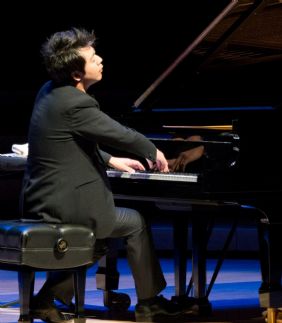|
Symphony
MONUMENTAL MAHLER 5TH IN SO CO PHIL'S SEASON ENDING CONCERT
by Terry McNeill
Sunday, April 14, 2024
Chamber
OAKMONT SEASON CLOSES WITH STRAUSS' PASSIONATE SONATA
by Terry McNeill
Thursday, April 11, 2024
Chamber
MORE GOLD THAN KORN AT ALEXANDER SQ CONCERT
by Terry McNeill
Sunday, April 7, 2024
Choral and Vocal
VIBRANT GOOD FRIDAY REQUIEM AT CHURCH OF THE ROSES
by Pamela Hicks Gailey
Friday, March 29, 2024
TWO OLD, TWO NEW AT THE SR SYMPHONY'S MARCH CONCERT IN WEILL
by Peter Lert
Saturday, March 23, 2024
Chamber
NOT A SEVENTH BUT A FIRST AT SPRING LAKE VILLAGE CONCERT
by Terry McNeill
Wednesday, March 20, 2024
THIRTY-THREE PLUS VARIATIONS AND AN OCEAN VIEW
by Terry McNeill
Saturday, March 16, 2024
Choral and Vocal
A ST. JOHN PASSION FOR THE AGES
by Abby Wasserman
Friday, March 8, 2024
Choral and Vocal
SPLENDID SCHUBERT SONGS IN SANET ALLEN RECITAL
by Terry McNeill
Saturday, March 2, 2024
Chamber
SHAW'S MICROFICTIONS HIGHLIGHTS MIRO QUARTET'S SEBASTOPOL CONCERT
by Peter Lert
Friday, March 1, 2024
|
 |
 Lang Lang Playing Chopin's Aeolian Harp Study Feb. 17 |
CHOPIN, CHOPIN, LANG, LANG
by Terry McNeill
Tuesday, September 17, 2013
It’s always a recital of surprises when the exciting pianist Lang Lang plays. In a reprise concert from last season’s Weill Hall opening gala, the Chinese virtuoso eschewed 2012’s conventional format of Mozart Sonatas and Chopin Ballades and chose Sept. 17 a mixed bag of Chopin works that alternatively titillated and enraptured a full house that included 50 stage seats.
Mr. Lang’s pianism is startlingly complete with an inexhaustible command of technical details. Even in difficult cross-hand and speedy double-note passages, or in wide skips for both hands, his aim is infallible, and his pedaling precise. This was quickly evident in the opening G Minor Ballade, Op. 23, where the introduction and first theme were played ever so slowly. Slow thematic development is a hallmark of his playing, mostly a good thing, as Mr. Lang was clearly going to tell hearers a story with this and the F Major and F Minor Ballades. He did this by often teasing the phrase endings that almost broke the melodic lines and the story arc. Almost but not quite. And although he rarely tampers with the score, in the First and Fourth Ballade the pianist added long ritards in unique places and little sforzandi and deep bass notes to seemingly spice the texture.
The C-Sharp Minor Study of Op. 25 was pensive and achingly slow, as was the F Major Nocturne from Op. 15, the second work for me the loveliest performance of the first half. Closing the first part brilliantly was the E Flat Waltz of Op. 18, the flurry of repeated notes powerfully played and with a maximum amount of facial mugging and torso stretching.
Contrary to many notions, Mr. Lang’s best playing comes not from pyrotechnical scales and calculated drama but from his exquisite and delicate touch in short and long soft passages. His pianissimo control is superb, among the best of any living pianist. An example is the E-Flat Major Nocturne of Op. 55, a piece he played as an encore last year on the same stage, and the super slow tempo worked to his advantage. The high repeated B Flats were shafts of distant light rather than the usually described bell tones. The gold standard for this piece is Ignaz Friedman’s iconic 1936 recording, and Mr. Lang’s playing of this masterful Nocturne was an object lesson of the pianist’s touch and control. At the end, a slightly dissonant b flat-a flat-f-b flat chord hung in the air for seconds, the piano’s perfectly-adjusted damper fall resolving magically into the final resonance of three hushed e-flat chords. Breathtaking.
Chopin’s virtuosic and showy Andante Spianato and Grand Polonaise ended the recital and was performed in the currently-accepted juxtaposition of tempos, the delicate Andante slow and dreamy and after a 16-bar introduction, a rapid jeu d’espirit Polonaise. This is the opposite way of past performance practice. But of course the big final five E Flat chords brought down the house, and the pianist played a fetching lyrical Chinese work, “Changes in the Moon,” after remarking to the rapt audience that a glorious late summer full moon was in the sky.
The printed program mixed up the pieces but Mr. Lang in short remarks to the audience announced an extra haunting Mazurka from Op.17, the Op. 25 “Aeolian Harp” Etude (serenely performed) and the D Flat Waltz (“Minute”), the last played with blazing speed, lengthy right-hand trills and a deliciously tasteless ending.
The recital was the first public hearing of the Hall’s newest concert piano, chosen in New York in August by Mr. Lang and prepared by the Hall’s insouciant consulting piano “curator,” Peter Sumner, and staff technician Larry Lobel. Both men were present to greet the artist and hear the instrument put vividly through its paces.
Lang Lang is an artist who has to be taken on his own terms, and what is pretentious playing to some is astounding pianistic entertainment to a great many. Piano recitals are the happy beneficiaries.
|

